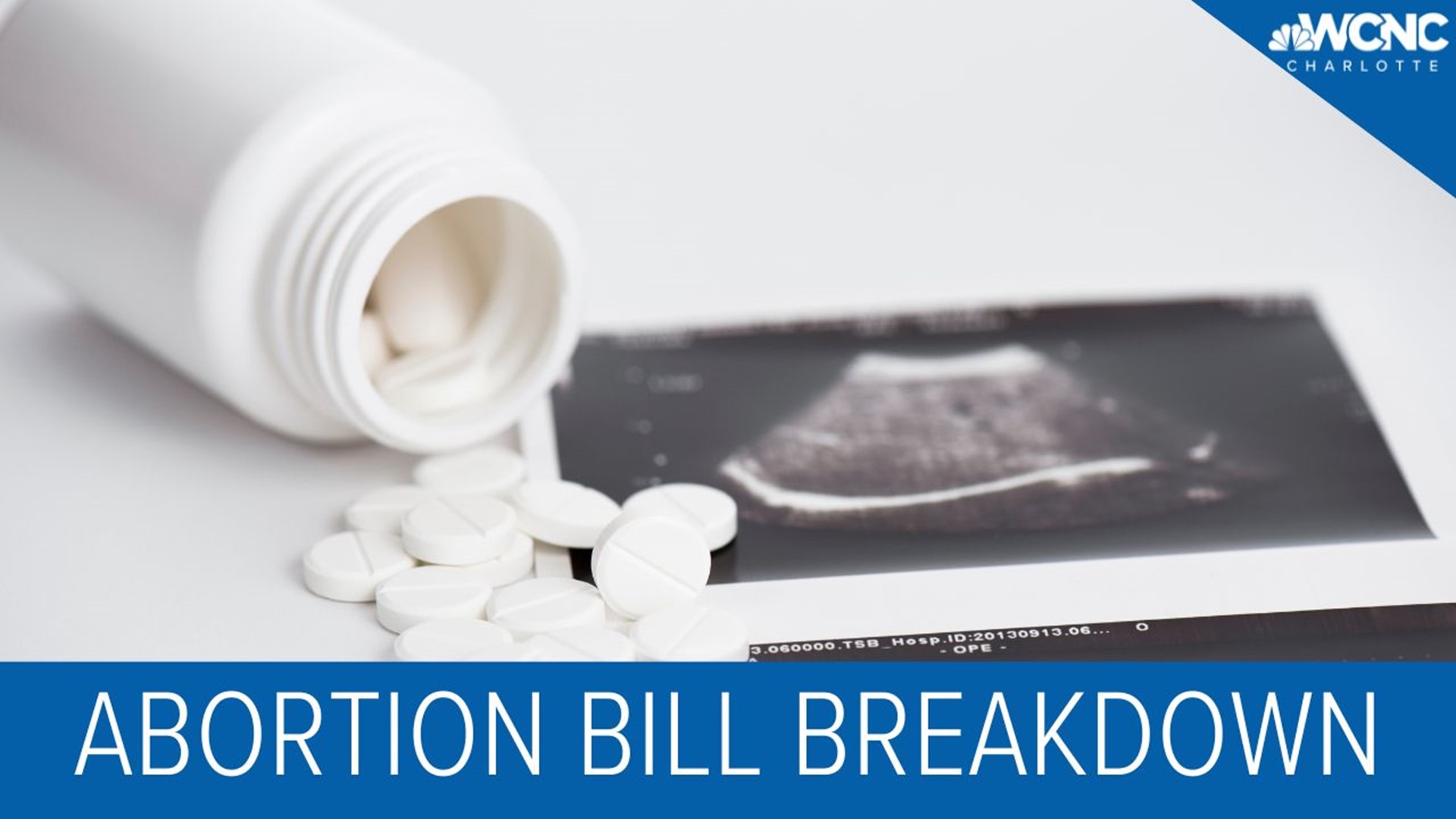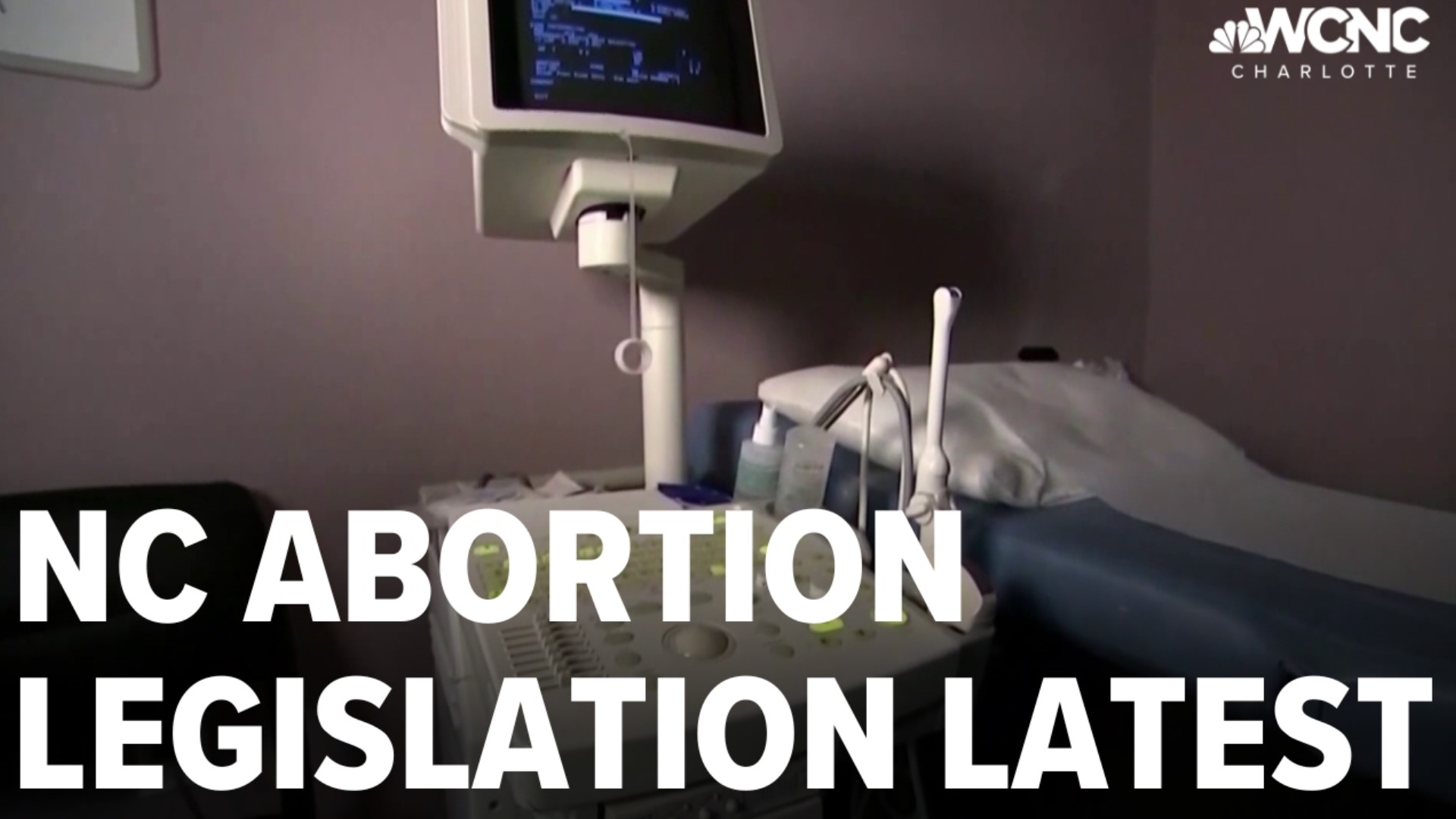CHARLOTTE, N.C. — The Republican-backed bill to ban nearly all abortions after 12 weeks, down from the current 20 weeks, is now on Governor Roy Cooper's desk after being passed by the North Carolina General Assembly on Thursday.
Governor Cooper has 10 days to veto the bill and send it back to the General Assembly, which has the votes to override the veto, thanks to the Republican's "veto-proof" supermajority.
The 46-page bill includes details about exceptions, administrative requirements for abortion providers and funding for early childhood care, among other items. WCNC Charlotte breaks down the details for you.
The bill includes exceptions for rape, incest, life-limiting anomalies and medical emergencies. Medical experts at Duke University broke down where the legislation was unclear and what they expect to happen if it becomes law.
"As it's written, it will make it very challenging for health care providers to interpret it to understand who will merit care after 12 weeks, who won't," Dr. Beverly Gray, a Duke University Associate Professor in the Department of Obstetrics and Gynecology, said.
What happens after 12 weeks
What the bill says: After 12 week and before 20 weeks, an abortion is legal when the procedure is performed by a qualified physician when the woman's pregnancy is a result of rape or incest.
What experts say: This could limit access to care, particularly for North Carolinian youth.
"Sometimes these children don't understand their bodies, some haven't even started their first period yet," Dr. Gray said. "And they may find themselves pregnant at a later time and you can imagine that for a child that doesn't understand their body, they might find themselves further along in their pregnancy."
What happens after 20 weeks
What the bill says: After 20 weeks and before 24 weeks of a woman's pregnancy, if a qualified physician determines there is a life-limiting anomaly for the fetus there may be an exception to the ban.
A “Life limiting anomaly” in the bill doesn’t list the exact medical conditions that would qualify. Instead, it says a qualified physician would have to diagnose the life-limiting physical or genetic condition and it must be supported by current medical evidence and is uniformly diagnosed.
What experts say: "That's not a term that we use in medicine," Dr. Gray said. "I mean, I think it's hard to define what is life-limiting. And then how will those enforcing the law determine what's life-limiting? It's incredibly unclear. And so physicians and hospitals will have to interpret that language."
What happens after 24 weeks
What the bill says: Women would be allowed to get an abortion after 24 weeks if it were declared a medical emergency by a doctor.
What experts say: "There there are progressive issues that can get worse in pregnancy, including between that 12 and 20-week mark," Dr. Jonas Swartz, Duke University’s Department of Obstetrics and Gynecology Director of Family Planning and an assistant professor said. "And so what level of health risks do they need to rise to for us to be able to decide that we can move forward with an abortion."
Apart from the exceptions listed above, there are a slew of administrative requirements for abortion providers.
New administrative requirements
Additional administrative requirements in the bill would reduce access to abortions and may lead to an increased burden of providing abortion care.
What the bill says: It requires clinics to have an additional "ambulatory surgical center" license and abortions after 12 weeks must happen in a hospital setting.
What the experts say: "We safely provide care in outpatient settings across the state right now between 12 and 20 weeks," Dr. Swartz said. "And this bill limits care after 12 weeks to hospitals, that provision is completely counter [to] any evidence on the safety and quality of abortion on the safety and quality of abortion, which shows that abortion is safe, up through the second trimester in outpatient centers."
Planned Parenthood released a statement saying it does not have any health centers in North Carolina that currently meet all of the requirements of the new license and added that many facilities will not be able to meet them in the near future either.
Required in-person office visits
What the bill says: Drug-induced abortion requires at least two visits, with the first being at least 72 hours before the abortion, in person. Patients must also visit the office to obtain abortion pills, as well as 14 days after a medical abortion.
Many people do not have the resources, time or means of transportation to make frequent office visits.
"People would have to get child care, take off work for an additional day for completely unnecessary visits to get state-mandated counseling," Dr. Swartz said.
More money in the bill
What the bill says: Republican lawmakers have put nearly $180 million of funding into the bill. That includes money to expand access to child care, reduce infant and maternal mortality, additional money for foster care, kinship care, and children’s homes, money to help people without insurance pay for birth control, and additional money over the next two years for community college tuition grants.
Shamarria Morrison: Contact Shamarria Morrison at smorrison@wcnc.com and follow her on Facebook, Twitter and Instagram.
Flashpoint is a weekly in-depth look at politics in Charlotte, North Carolina, South Carolina, and beyond with host Ben Thompson. Listen to the podcast weekly.
SUBSCRIBE: Apple Podcasts || Spotify || Stitcher || Google Podcasts
All of WCNC Charlotte's podcasts are free and available for both streaming and download. You can listen now on Android, iPhone, Amazon, and other internet-connected devices. Join us from North Carolina, South Carolina, or on the go anywhere.


